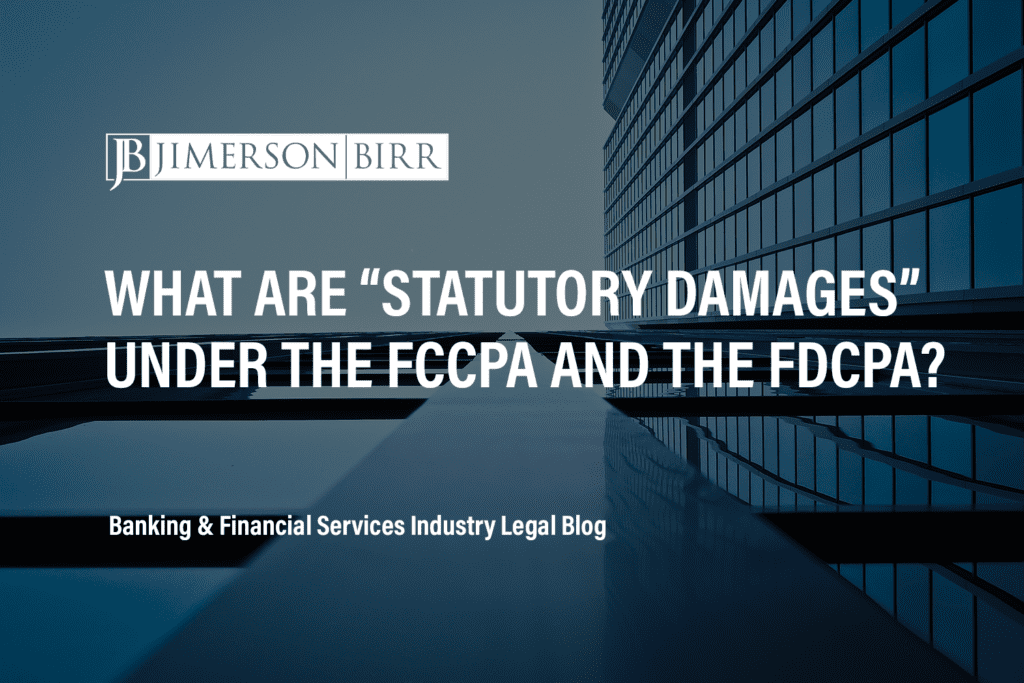The Florida Consumer Collection Practices Act (FCCPA) and the Fair Debt Collection Practices Act (FDCPA) are two pro-consumer statutes. Businesses should be aware of each statute. Oftentimes, consumer lawyers bring claims for technical violations of the statutes, even when there are not any actual damages suffered by a consumer. When that happens, businesses need to be aware of their rights and the potential exposure under the FCCPA and the FDCPA.
I have written multiple articles on the FCCPA and the FDCPA. One of my prior articles provided a general overview of the difference between the FCCPA and the FDCPA. See What is the Difference Between the FDCPA and the FCCPA? | Jimerson Birr (jimersonfirm.com). Additionally, my most recent article evaluated what constitutes “actual damages” under the FCCPA. What Are “Actual Damages” Under the FCCPA and the FDCPA? This article seeks to explore what constitutes “statutory damages” under the FCCPA and the FDCPA.
What damages are available under the FCCPA and the FDCPA?
Both the FCCPA and the FDCPA provide for the same or similar elements of damages for a violation of the statute. Specifically, a successful plaintiff is entitled to recover: 1) actual damages; 2) statutory damages up to $1,000.00; and 3) attorneys’ fees and costs. §559.77(2), Fla. Stat.; 15 U.S.C. § 1692k. Injunctive relief and punitive damages are also potential elements of damages under the FCCPA. §559.77(2), Fla. Stat.
What are “statutory damages” under the FCCPA and the FDCPA?
Both the FCCPA and the FDCPA specifically allow for the recovery of statutory damages. §559.77(2), Fla. Stat.; 15 U.S.C. § 1692k. Each statute limits the amount of statutory damages to $1,000.00. §559.77(2), Fla. Stat.; 15 U.S.C. § 1692k. Additionally, each statute affords the court discretion in determining the amount of the statutory damages to be awarded. §559.77(2), Fla. Stat.; 15 U.S.C. § 1692k. However, it should be noted that neither the FCCPA nor the FDCPA permits a plaintiff to recover statutory damages in the amount of $1,000.00 per violation. Arianas v. LVNV Funding LLC, 54 F. Supp. 3d 1308, 1311 (M.D. Fla. 2014). Rather, the statutory damages are limited to $1,000.00 even when a series of the same type of violation has occurred. Id.
Statutory damages may be awarded even when the plaintiff cannot prove “actual damages.”
While it seems intuitive that a party must prove that he or she has actually suffered damages as a result of another party’s conduct, the FCCPA and FDCPA essentially provide for an alternative. Stated differently, once a party can demonstrate that there has been a technical violation of the statute, the party can sue for statutory damages.
In Laughlin v. Household Bank, Ltd., 969 So. 2d 509 (Fla. 1st DCA 2007), the business attempted to defend against an FCCPA violation by aruing that even if there was an FCCPA violation, the consumer had not incurred any damages and therefore the business should be entitled to summary judgment. However, the First District Court of Appeal disagreed and held that the plaintiff “is not required to prove actual damages, but only a violation of one of the prohibited practices in the FCCPA.” Laughlin, 969 So. 2d at 513.
The Laughlin Court explained that the FCCPA allows for statutory damages in order to provide a penalty designed to dissuade businesses from engaging in the prohibited conduct in the first place. By providing for the ability to recover statutory damages, the legislature intended to provide a remedy for a class of injury where damages are difficult to prove. Id.
Conclusion
A successful plaintiff who proves that there was a violation of the FCCPA or the FDCPA may be entitled to recover statutory damages even if the plaintiff has not suffered any actual damages. As such, businesses that are confronted with alleged FCCPA or FDCPA violations need to be aware of the risk and potential exposure for damages as well as the plaintiff’s ability to recover attorneys’ fees. The next article will further evaluate a business’s potential exposure to attorneys’ fees under the FCCPA and the FDCPA.
About the Author: Austin T. Hamilton, Esq. is board certified in business litigation by the Florida Bar and practices in the firm’s banking and financial services industry team. Austin advises businesses regarding potential consumer violations under various Florida and federal consumer protection statutes and is experienced in defending businesses against alleged violations of consumer protection statutes.
Similar/related articles:
What is the Difference Between the FDCPA and the FCCPA? | Jimerson Birr (jimersonfirm.com)

